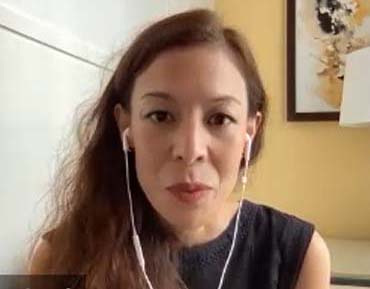By Lucy Komisar
Oct 16, 2021
“United States vs. Reality Winner” directed by Sonia Kennebeck is a fake documentary that opened the Double Exposure Film Festival October 13th. It is a deceptive and dishonest film that carefully avoids telling the true story of this phony “heroine” who leaked an unverified document that said the Kremlin hacked U.S. voting machines and was sentenced to prison under the Espionage Act.
Reality Winner at 25 was an Air Force veteran in the military for six years, a translator who spoke Farsi, Dari, and Pashto and worked for the National Security Agency. She had language skills but, leaving school as a teenager, not much education. She was accused of leaking an NSA document that spun a long story about an unproved Russian attempt to hack American voting machines in 2016.
The film promo says: “A state of secrets and a ruthless hunt for whistleblowers – this is the story of 25-year-old NSA contractor Reality Winner who disclosed one document about Russian election interference to the media and became the number one leak target of the Trump administration.”
It takes some doing to spend 94 minutes in a film about a victim of the intel/surveillance state without ever once saying what she is charged with doing.
To hail her as a whistleblower without saying who she blew the whistle on.
To indicate took (stole) a document with the detail that she got it out “folded and hidden in panty hose” without ever saying what the document said.
Moreover, the number one target of the Trump administration has been Julian Assange, a real hero for publishing solid evidence of U.S. war crimes, hardly Reality Winner.
Is the film just bad journalism? Or a deliberate attempt to create a heroine where there was only a fool? In order to make a film possible? You don’t do a documentary about a person who revealed no evil but stole and sent media an unverified document containing Russophobic claims that turned out not to be true.
After all, the filmmaker surely read the story in The Intercept, to whom Winner sent the paper. Two days after her arrest, the website The Intercept published an article June 5, 2017 about a top-secret NSA document dated May 5, 2017 that described alleged Russian attempts to hack the U.S. voting system, including a cyberattack against an unnamed company that sells voter-registration-related software and phishing attempts against 122 local election officials. There was no evidence supplied, just colorful graphics.
According to The Hill, which read the document more carefully: “The report does not claim that voting machines were hacked, a once-popular post-election theory from Democrats, nor does it state whether the information pertaining to the voting systems could be used to hack those systems.”
And federal officials told a Senate hearing just after The Intercept report in 2017 that there was no evidence state voting was hacked. (One might assume that if the spooks had real evidence, they would leak it to their media acolytes.)
For sending The Intercept the document, she was charged under the Espionage Act, accused of potentially causing “exceptionally grave damage” to national security by leaking a classified document that, the government claimed, contains “national defense information.”
No Evidence
Media including the NYTimes would write that Reality was “accused of sharing a classified report about Russian interference in the 2016 election with the news media.” [ignore strike through, the link works] None of the “interference” was ever documented. And it would say the report “described hacks by a Russian intelligence service against local election officials and a company that sold software related to voter registration.” Also not documented. There was nothing in the report proving Russian intelligence interference and hacks. (See The Hill.)
The film didn’t find time to deal with any of what was revealed by media. When an FBI agent asks “have you discussed classified” information?, that’s as close as it gets. Though director Kennebeck does manage to include a segment of Reality baby pictures. In a post-film discussion, Kennebeck says she researched the story. That isn’t evident.
Winner pleaded guilty in 2018 in order to avoid a trial she could not afford and a defense made difficult by the government banning her lawyers, who were in different cities, from discussing the case other than in a secure room. She was sentenced to 63 months in prison, the longest sentence ever given for releasing government information to the media. She was released in June to a halfway house and now is seeking a pardon.
Winner vs Real Whistleblowers
A whistleblower is someone who reveals wrong-doing by a public or private person or agency/ organization/company. Federal employee Reality Winner didn’t blow the whistle on any person or agency, she just leaked a confidential document she wanted made public.
The director throws in interviews with Ed Snowden (who blew the whistle on NSA spying on Americans), John Kiriakou (who blew the whistle on CIA waterboarding of al-Qaeda prisoners), and Dan Ellsberg (who gave media the Pentagon Papers about U.S. failures in the war on Vietnam). They were real whistleblowers who revealed proven U.S. government misconduct, and using them to suggest Winner is one of their ilk is disingenuous and deceptive. They talk about the espionage law, not her case. Their patina does not rub off.
What motivated Winner to do the leak? Was she a patriot who wanted to warn the public of alleged Russian interference in the election or simply a Russophobe seeking to lob another attack? The film could have explained this, but it didn’t try. She hasn’t said and the filmmaker didn’t ask. Since it avoided talking about the document, it obviously couldn’t. Pretty ironic if this witless “super-patriot” was caught in the American surveillance net.
“United States vs. Reality Winner,” Directed by Sonia Kennebeck, produced by Ines Hofmann Kanna, 2021. Opened Double Exposure Film Festival, Online and in Washington D.C., October 13, 2021. Review on NYTheatre-Wire.
See this investigative piece, Did the CIA set up Reality Winner?



